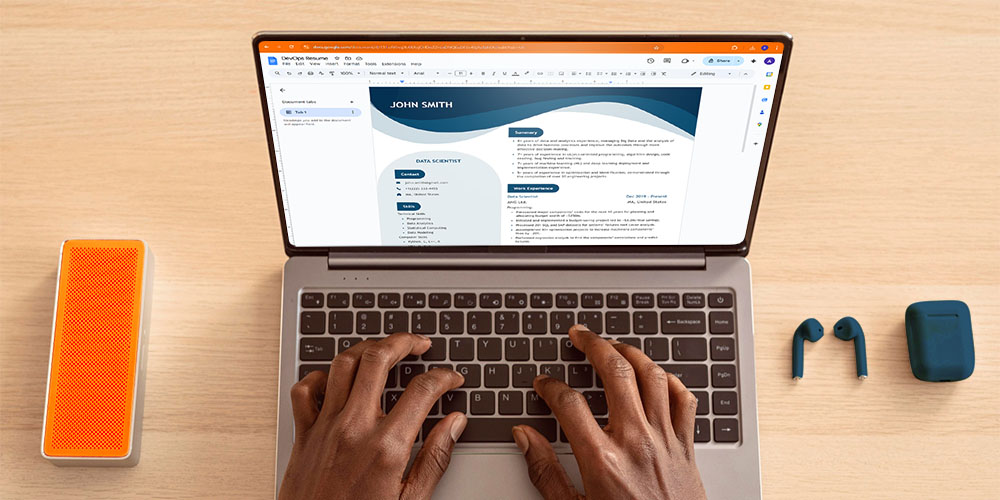
DevOps is a methodology that consists of a combination of IT operations and software development. Back in 2018, the market size estimation for DevOps was valued at more than 3 billion dollars, and it is about to grow over 20 billion by 2026. Therefore, working in this profession can be highly beneficial. To apply for a DevOps Engineer role, you need to prepare a well-written resume that covers all of your relevant skills and abilities which increase your chances of employment. So how do you do that? Here Radviser will go through some keynotes on how to prepare your DevOps resume step by step. Let’s begin!
resume_2_dark_banner
1. Format
The best way to create a DevOps engineer role resume is to write it chronologically. Most recruiters worldwide prefer this format since it is plain yet detailed. This format allows you to mainly focus on your work experiences and highlight them rather than other sections, such as education or achievements. Therefore, writing this way will help you win their attention.
2. Layout
Once you decide on the chronological format of your resume, it’s time to work on the details and its layout.
- Use an easy-to-read font type and size to look professional. Stick to the norm and go with 10 to 12 pts for your standard text and 16 pts for your titles.
- Set margins for your resume to avoid a messy look
- Use the H2 subheading where necessary to highlight different sections
- Always save your resume as a PDF file to avoid messing it up while opening it with other computers and devices. That is, of course, if the potential employer has not specifically requested a Microsoft Word resume file from you.
You can always use outside help or resume templates to avoid mistakes in the formatting or layout sections. This will allow you to look professional without much struggle which can take hours.

3. Header
Here you will be able to provide information that can be used to contact you. Write only what is considered necessary.
- Your full name
- Your profession/ job title
- Phone number
- Email address
- Your location, as at which city or country you reside
You can also add a link to your LinkedIn or other relevant accounts. Keep in mind that your social media, such as Facebook or Twitter, are not considered professional, so there is no need to mention them in your resume.
4. Effective Summary as a DevOps Engineer
There is only a very small window of time frame, less than 10 seconds, for a recruiter to look at someone’s resume. If a recruiter does not consider the resume relevant to the advertised position, then it will be skipped and never looked at again. What does this mean for you? It means that you have to be able to write a short summary of your career that grabs the attention of the recruiter. Mention and highlight your roles, years of experience, and major achievements in the DevOps field. List the skills that are most relevant to a DevOps engineer’s role, and don’t forget to keep it short and simple.
cover_5_light_banner
5. Professional Experience
In this section, you will have a chance to fully explain your experience in DevOps, including your most recent role and position. From there, you can go back and write down any other experience you had in other companies. Make sure to add the achievements and responsibilities you had in each role to be convincing with solid evidence.
6. Education
Since education’s role in the DevOps field is less important than work experience, you better write the education section lower than your experiences. This might be tricky so you have to be careful and consider the risks. Write your latest education first. If you have a second degree, add it after it. Keep the education section simple. There is no need to add your high school education as long as you have higher education. If you don’t have any DevOps-related work experience, you can add your education achievements in detail and mention the courses you attended along with certificates.

7. Relevant Skills
In order to be an ideal candidate for a DevOps engineer, you must possess a mixture of hard and soft skills. Hard skills for a DevOps role could be understanding networking protocols or deployment. As for soft skills, critical thinking and problem-solving are considered good examples.
These are not all necessary skills but are considered very important. Another critical note to keep in mind is that you need to know how to list your skills in a way that is relevant to the position you are applying for. If a skill is required for that role and you have it, make sure to mention it first. If it is not considered essential, you may skip it to avoid writing an unnecessarily long resume.
job_1_dark_banner
Conclusion
Preparing a well-written resume doesn’t have to be an extremely complicated task. Stick to the given notes provided here while writing your resume, and your chances of landing a role you desire as a DevOps engineer will increase to a large extent. If you want to know more about resume writing, you can explore our Library or have a look at our resume writing handbook.












